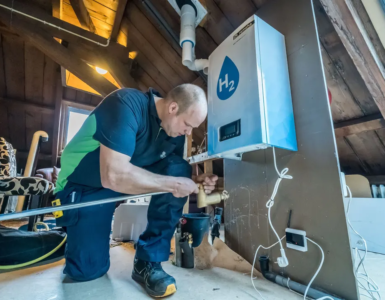Hydrogen not suitable for heating British homes, infrastructure report says – E&T.
Hydrogen should not be used to power individual buildings and policy efforts should be shifted towards the mass installation of heat pumps, a report from the National Infrastructure Commission (NIC) has said.
In wide-ranging review of the UK’s infrastructure, the body asserted that electrification was the only viable option for decarbonising buildings at scale and reducing the country’s reliance on fossil fuels.
Gas boilers currently heat around 88 per cent of English buildings, but need to be phased out rapidly for the country to meet its climate commitments. Around eight million additional buildings will need to switch to low-carbon heating by 2035, and all buildings by 2050.
🔥 What about we co-host a webinar? Let's educate, captivate, and convert the hydrogen economy!
Hydrogen Central is the global go-to online magazine for the hydrogen economy, we can help you host impactful webinars that become a global reference on your topic and are an evergreen source of leads. Click here to request more details
The government is currently looking at plans to start pumping a 20 per cent hydrogen gas blend into the supply network as early as 2028.
But the NIC said its analysis
demonstrates that there is no public policy case for hydrogen to be used to heat individual buildings.
It urged the government to devote £1.5bn to £4.5bn annually to improve energy efficiency and install heat pumps across the public sector and social housing in a bid to boost supply chains.
This includes the provision of an upfront subsidy of £7,000 to households installing heat pumps or connecting to heat networks, alongside access to zero per cent financing.
However, the NIC also recognises that hydrogen will play a key role in decarbonising the industrial sector. “Core networks of infrastructure to transmit and store hydrogen and carbon are essential by 2035,”
Elsewhere, the report recommended major upgrades to public transport networks in England’s most congested cities in a bid to provide boosts to local economic growth. This could include measures such as congestion charging, which is already in place in Central London, and workplace parking levies to reduce car use.
More devolution and bigger local transport budgets are “essential” for transport enhancements across the country as they will give local authorities the freedom to decide on local priorities, such as fixing potholes, zero-emission buses and road improvements.
Building additional water supply infrastructure and reducing leakage was also a key proposal. The NIC said that compulsory water metering could be introduced as part of efforts to reduce water demand, and that improvements to flooding infrastructure should be prioritised in preparation for future weather events driven by climate change.
It urged the implementation of a new set of reforms to meet a 65 per cent recycling target by 2035 and phasing out energy-from-waste plants that do not include carbon capture facilities.
Finally, the report called for gigabit-capable broadband to be made available nationwide by 2030 alongside the roll-out of new 5G services.
Sir John Armitt, Writing in the report’s foreword, NIC chair, said:
The good news is that modern, reliable infrastructure can support economic growth, help tackle climate change and enhance the natural environment.
“We stand at a pivotal moment in time, with the opportunity to make a major difference to this country’s future. But we need to get on with it.
“People often talk about infrastructure as the backbone of our economy. What our infrastructure needs now is the collective mettle to turn commitments into action that will reap rewards for decades to come.”
Jordan Cummins, CBI’s UK competitiveness director, said:
The CBI welcomes this report, which is timely and recognises the need for major public transport upgrades in the UK’s most congested cities to unlock economic growth. It further acknowledges the need to deliver a strong focus on upgrading the UK’s energy infrastructure if we are to meet our legally binding commitments to being a net-zero economy by 2050.
“Planning reform and a more agile and responsive approach to delivering connectivity of energy projects into the national grid network will be crucial if we are to achieve this. Similarly, policy stability and certainty around the delivery of major infrastructure will provide the long-term confidence and clarity businesses need to invest and drive economic growth across the UK.”
READ the latest news shaping the hydrogen market at Hydrogen Central
Hydrogen not suitable for heating British homes, infrastructure report says – E&T. source








